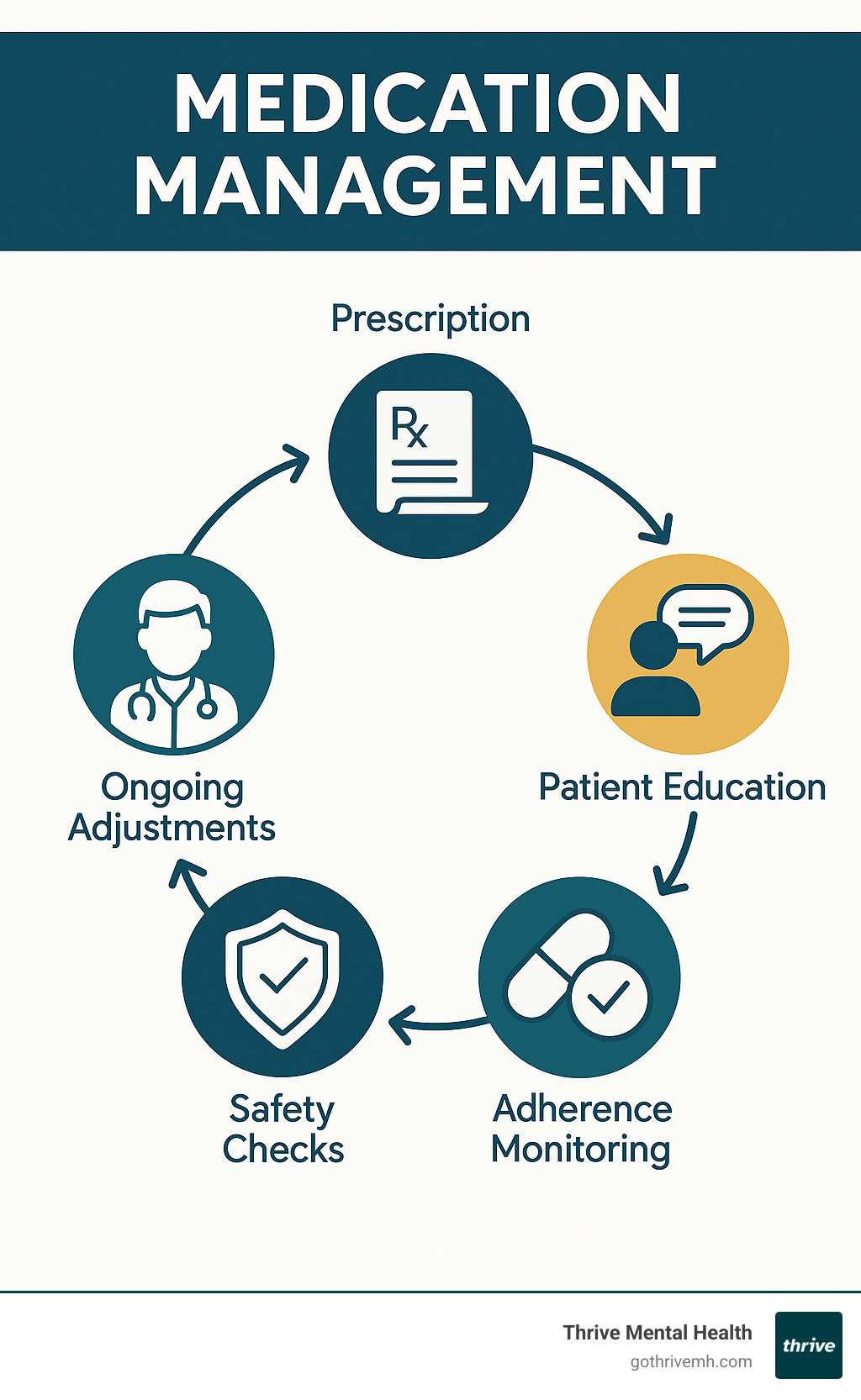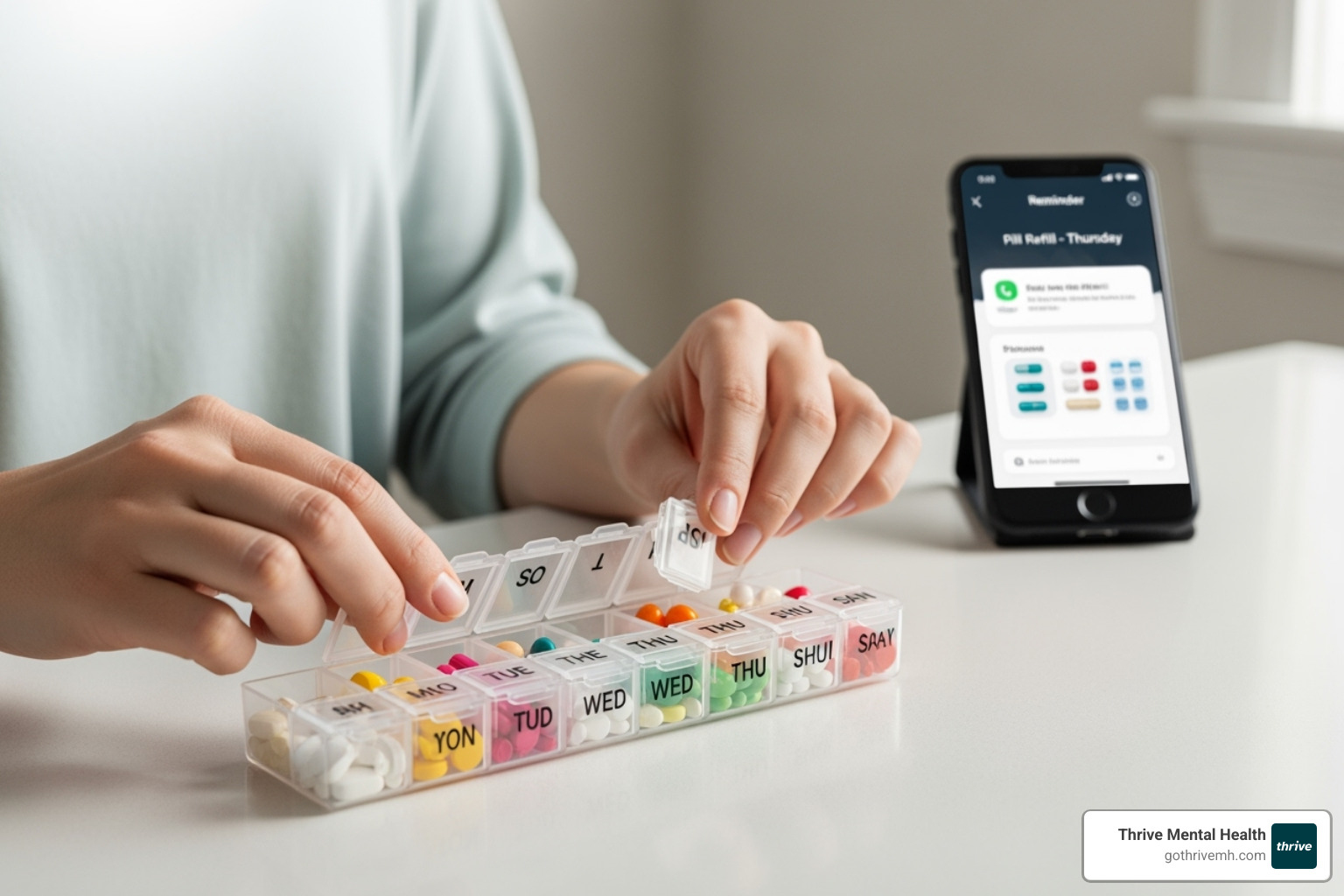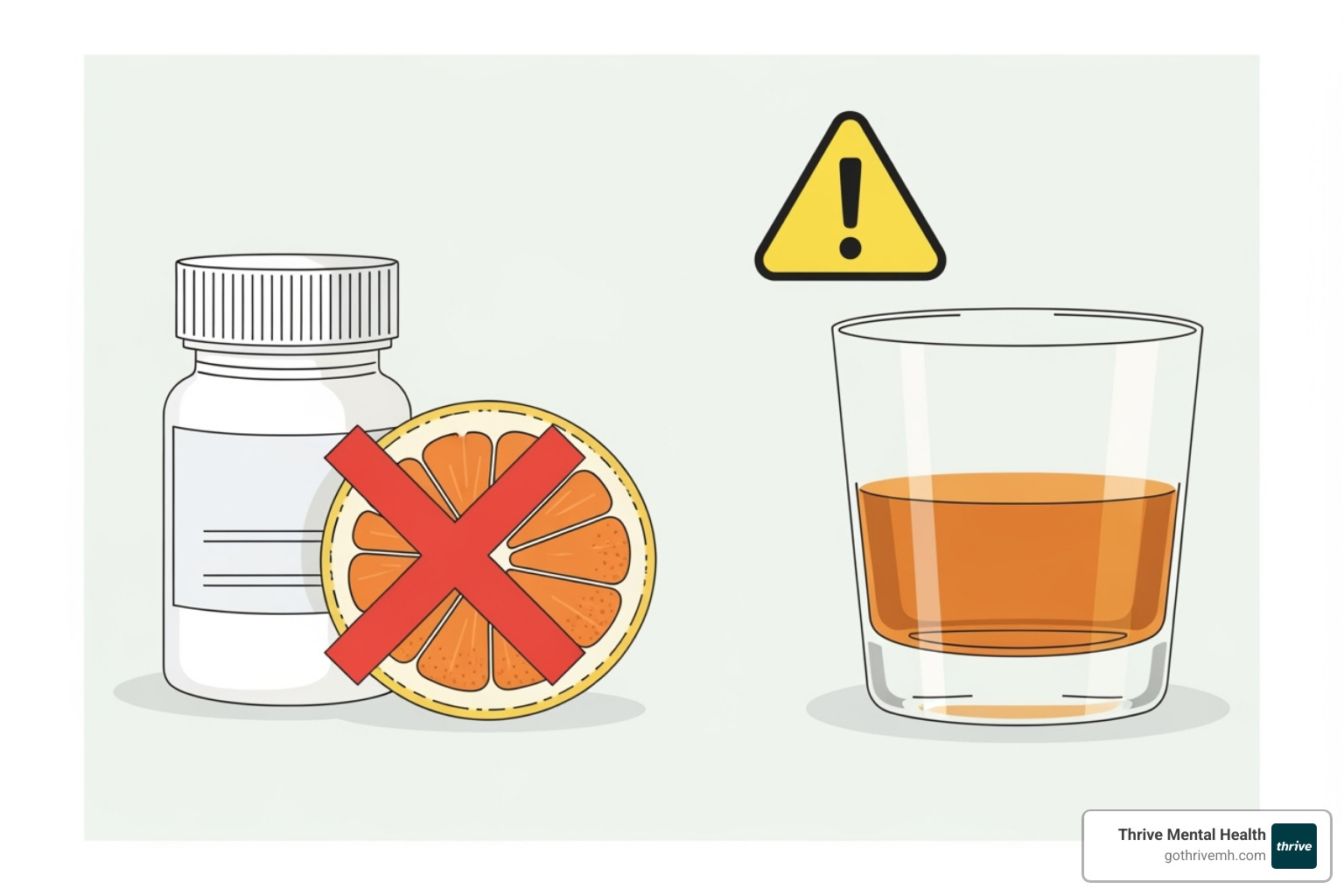Pill Power: Your Guide to Effective Medication Management

Why Medication Management Is Critical for Your Health and Well-being
Medication management is the process of ensuring medications are used safely and effectively to optimize health outcomes. For busy professionals across Florida managing mental health conditions, proper oversight can mean the difference between thriving and merely surviving.
What medication management includes:
- Medication reconciliation: Creating an accurate list of all current medications.
- Safety monitoring: Tracking side effects and drug interactions.
- Adherence support: Using tools and strategies to take medications correctly.
- Regular reviews: Working with healthcare providers to adjust treatments.
- Patient education: Understanding what each medication does and why it’s needed.
The numbers are compelling: around 60% of U.S. adults use prescription drugs, but up to 50% don’t take them as prescribed, often due to “pill fatigue.” This can lead to some of the 1.5 million preventable adverse drug events that occur annually, costing the nation $177 billion.
For young professionals in Florida with anxiety, depression, or other mental health conditions, effective medication management is crucial. The right approach, like the support offered through our vital mental health services, reduces side effects, prevents dangerous interactions, and ensures treatments work as intended—all while fitting into a busy lifestyle.
As Nate Raine, CEO of Thrive Mental Health, I’ve seen how proper medication management transforms lives, helping our clients in Florida integrate their treatments seamlessly into demanding schedules. When done right, it empowers rather than burdens.

Medication Management vocabulary:
Understanding the Fundamentals of Medication Management
Mastering medication management basics makes the entire process easier. This section breaks down the core concepts, benefits, and team approach that makes it work.
What is Medication Management and Why Is It Important?
Think of medication management as your personal health GPS. It’s a complete system ensuring every medication you take—prescribed, over-the-counter, or supplemental—helps rather than hurts. With millions of Americans taking prescription drugs, preventable mishaps are common and costly. Effective management helps you avoid these issues by:
- Optimizing therapeutic outcomes: Ensures your medications work as intended, which is vital when treating conditions like anxiety or depression.
- Preventing adverse drug events: Catches and avoids harmful reactions between different drugs.
- Reducing healthcare costs: Avoids expensive emergency room visits or hospital stays caused by medication errors.
- Improving quality of life: Replaces confusion and overwhelm with confidence and control over your health.
To ensure safety, healthcare relies on the “5 Rights” of medication administration: right patient, right drug, right dose, right route, and right time. Embracing these principles leads to patient empowerment, turning you into an active partner in your wellness journey.
The Key Components of a Successful Plan
A successful medication management plan requires several key components working together.
- Medication reconciliation: This is the foundation. Create a complete, accurate list of everything you take—prescriptions, OTC drugs, vitamins, and supplements. Bring this list (or the bottles themselves) to every appointment.
- Comprehensive medication review: A healthcare professional reviews your entire medication list to check for appropriate dosing, timing, and potential interactions. It’s your chance to ask questions.
- Personalized care plan: This plan is custom to your life, conditions, and goals. At Thrive Mental Health, we integrate these plans into our Florida-based programs to support your overall mental health journey.
- Patient education: Understanding what each medication does, why you need it, and what side effects to watch for is empowering and improves adherence.
- Ongoing monitoring and follow-up: Regular check-ins with your healthcare team allow for adjustments as your body and conditions change. The Agency for Healthcare Research and Quality (AHRQ) emphasizes this continuous approach as a partnership.
The Collaborative Care Team: Roles and Responsibilities
You are the most important person on your medication management team. Your active participation is key. Here are the other members:
- You (The Patient): Keep your medication list updated, ask questions, and report side effects or concerns.
- Caregivers: Often assist with organizing medications, tracking symptoms, and communicating with providers.
- Physician/Prescriber: Provides medical expertise, diagnoses conditions, and prescribes the right medications. For mental health, this may be a psychiatrist or psychiatric nurse practitioner.
- Pharmacist: Your medication safety expert. They check for interactions, explain how to take drugs properly, and answer questions.
- Nurse: Often administers medications, monitors for reactions, and provides patient education and support.
- Mental health professionals: Specialize in medications for conditions like anxiety, depression, and ADHD. At Thrive Mental Health, our team integrates medication with therapy for the best outcomes, a core part of our Vital Mental Health Services.
Practical Strategies and Tools for Success
Medication management doesn’t have to be a struggle. With the right strategies, you can turn a daily chore into a smooth, confident routine, just like you’ve mastered other complex parts of your life.
Creating and Maintaining Your Medication Routine
“Pill fatigue” is a real issue, causing up to 50% of people to take their medications incorrectly. You can avoid this by creating systems that fit your lifestyle.

- Use pill organizers: Weekly organizers with daily compartments eliminate guesswork and save time.
- Maintain a medication list: Keep a current list of all prescriptions, OTC drugs, and supplements with you at all times. Share it with every healthcare provider.
- Set digital reminders: Use smartphone alarms or dedicated apps to track doses, log side effects, and manage refills.
- Link doses to daily habits: Take your medication with an established routine, like your morning coffee or brushing your teeth, to make it automatic.
- Use visual cues: Keep medications (safely stored) where you’ll see them when it’s time to take them, but ensure they are out of reach of children and pets.
These strategies reduce the mental load and make adherence easier, freeing you to focus on your life.
Safe Medication Practices: Storage and Disposal
Proper storage and disposal are critical for medication safety and effectiveness.
- Proper storage conditions: Most medications should be stored in a cool, dry place, not the bathroom, where heat and humidity can degrade them.
- Childproofing: Store all medications out of reach and sight of children and pets, preferably in a locked cabinet.
- Check expiration dates: Regularly check dates and dispose of expired medications, as they can lose potency or become harmful.
- Keep original containers: These contain vital information like drug names, dosages, and instructions.
- Safe disposal methods: Avoid flushing medications. Use local take-back programs, which many Florida pharmacies offer. If unavailable, the FDA guidance on drug take-back programs suggests mixing them with an undesirable substance (like coffee grounds), sealing them in a bag, and placing them in the trash.
Communicating Effectively with Your Healthcare Team
Open communication with your healthcare team is essential for effective care.
- Prepare for appointments: Bring a list of all your medications (or the bottles themselves) and a list of questions.
- Ask key questions: Understand the purpose, dosage, timing, and potential side effects of each medication. Ask what to do if you miss a dose and what substances (food, alcohol) to avoid.
- Disclose everything: Be sure to tell your provider about all prescription drugs, OTC medications, and supplements you take to avoid dangerous interactions.
- Report side effects promptly: Never stop taking a medication without consulting your doctor, but always report new or unusual symptoms.
- Schedule an annual medication review: A yearly check-in with your doctor or pharmacist ensures your regimen is still appropriate for your current health needs.
For those seeking expert guidance, it’s helpful to understand The Benefits of Utilizing Mental Health Services that provide comprehensive support.
Overcoming Common Challenges and Special Considerations
Even with the best intentions, medication management can be challenging. Understanding common pitfalls is the best way to avoid them, as most medication errors are preventable.
Avoiding Common Medication Mistakes
Juggling daily responsibilities can make medication management feel like another chore. Here are common mistakes to watch for:

- Polypharmacy: This term means taking five or more prescription drugs, which increases the risk of interactions. Schedule an annual medication review to ask your doctor if all are still necessary.
- Pill fatigue: The overwhelming feeling from a complex medication schedule. Use tools like pill organizers and reminders to combat it.
- Forgetting doses: This can reduce treatment effectiveness. Ask your pharmacist for a clear plan on what to do if you miss a dose—never double up without guidance.
- Incorrect dosages: Always double-check the dose with your pharmacist. Only split pills if they are scored and you’ve been shown the proper technique.
- Food and alcohol interactions: Seemingly harmless things like grapefruit juice or alcohol can interfere with medications. Ask your pharmacist about potential interactions.
- Mixing medications: Never combine prescriptions, OTC drugs, or supplements without professional guidance.
Medication Management for Specific Populations
Different life stages and health conditions require unique medication management approaches.
- Older adults: Face complex challenges due to taking multiple medications and age-related changes in how their bodies process drugs. The AGS Beers Criteria® for potentially inappropriate medication use in older adults is a key resource for identifying risky medications for seniors.
- Patients with chronic conditions: Conditions like heart disease or diabetes require consistent, long-term medication adherence, even when symptoms aren’t present, to prevent complications.
- Individuals with mental health conditions: Managing psychotropic medications for anxiety, depression, or bipolar disorder requires patience, as they can take weeks to work and may have initial side effects. Stigma can also be a barrier to adherence.
At Thrive Mental Health, we understand these challenges. Our virtual programs in Florida integrate psychiatric medication management with therapy, creating a sustainable plan that supports your overall wellness. This approach is detailed in our Comprehensive Guide to Behavioral Health Services.
Frequently Asked Questions about Medication Management
We hear many questions about medication management from our clients across Florida. Here are answers to the most common ones to help you feel more confident.
What is the role of a pharmacist in medication management?
Your pharmacist is an accessible medication expert and a crucial part of your safety net. They review prescriptions for correct dosages and dangerous interactions, contact your doctor if they spot an issue, and provide counseling on side effects and proper use. They can also recommend cost-effective generic alternatives, making them an invaluable ally in your medication management journey.
How can I ensure I’m taking my medications safely?
Safe medication use involves creating a protective system. Always follow the “5 Rights” (right patient, drug, dose, route, time). Keep a comprehensive, updated list of all medications, supplements, and OTC drugs to share with all providers. Use organizational tools like pill organizers and smartphone reminders to reduce errors and combat “pill fatigue.” Finally, ask questions until you understand your treatment, and contact your healthcare team if anything feels wrong.
Can medication management be done online?
Yes, and it’s revolutionizing mental health care. Telehealth allows for effective online medication management through secure video calls with licensed psychiatrists or psychiatric nurse practitioners. This is especially convenient for busy professionals. Your provider can diagnose conditions, prescribe most medications, and monitor your progress remotely. This approach integrates seamlessly with virtual therapy, which is a cornerstone of modern Mental Health Care Online and a key feature of our flexible programs at Thrive Mental Health.
Conclusion: Taking Control of Your Health Journey

Effective medication management is about taking control of your health, which is an incredibly empowering step. By understanding your medications, using practical tools, and communicating with your healthcare team, you become an active partner in your own well-being.
The strategies we’ve covered transform medication management from a source of stress into a seamless part of your routine. For busy professionals managing mental health, this is especially crucial. Your medications should support your goals, not complicate them.
At Thrive Mental Health, we see this change daily with our clients across Florida. Our programs integrate psychiatric medication management with comprehensive therapy, creating a foundation for lasting wellness. Proactive health management is about progress, not perfection.
Ready to take the first step toward optimized medication management and comprehensive mental health support? Explore our virtual intensive outpatient programs to start your journey with Thrive Mental Health. We’re here to provide the flexible, evidence-based care you need to thrive.